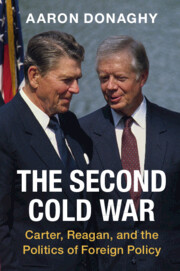Book contents
- The Second Cold War
- Cambridge Studies in US Foreign Relations
- The Second Cold War
- Copyright page
- Dedication
- Contents
- Acknowledgments
- Abbreviations
- Introduction
- 1 The Dwindling of Détente
- 2 “It’s All Political Now”
- 3 To the Right
- 4 Confrontation
- 5 The Nuclear Freeze Movement
- 6 Star Wars and the Evil Empire
- 7 The Most Dangerous Year
- 8 To the Center
- 9 Conciliation
- Epilogue
- Archives
- Notes
- Index
- Cambridge Studies in US Foreign Relations (continued from page ii)
1 - The Dwindling of Détente
Published online by Cambridge University Press: 22 April 2021
- The Second Cold War
- Cambridge Studies in US Foreign Relations
- The Second Cold War
- Copyright page
- Dedication
- Contents
- Acknowledgments
- Abbreviations
- Introduction
- 1 The Dwindling of Détente
- 2 “It’s All Political Now”
- 3 To the Right
- 4 Confrontation
- 5 The Nuclear Freeze Movement
- 6 Star Wars and the Evil Empire
- 7 The Most Dangerous Year
- 8 To the Center
- 9 Conciliation
- Epilogue
- Archives
- Notes
- Index
- Cambridge Studies in US Foreign Relations (continued from page ii)
Summary
Chapter 1 explores the first half of Jimmy Carter’s term as president, from January 1977 through to late 1978. The end of the “imperial presidency,” increased Congressional powers, and the rise of special interest groups complicated life for the new administration. Carter entered the White House amid wide conservative opposition to détente and his pursuit of a new SALT Treaty with the Soviet Union. He began placating critics of the SALT I agreement, particularly Henry Jackson, who had the potential to mobilize discontented, conservative Democrats and independents against a second SALT agreement, as well as Carter’s bid for a second term. The president courted Jackson and acted on his advice in 1977 as he pursued arms control negotiations with Moscow. When Soviet leader Leonid Brezhnev rejected the US proposals, Carter changed his approach in order to straddle the demands of his conservative critics and the need to maintain a working relationship with the Kremlin. The chapter also discusses Carter’s decision to promote the cause of human rights in Eastern Europe, the normalization of relations with China, and the quest to ratify the Panama Canal treaties in Congress.
Keywords
- Type
- Chapter
- Information
- The Second Cold WarCarter, Reagan, and the Politics of Foreign Policy, pp. 18 - 57Publisher: Cambridge University PressPrint publication year: 2021

